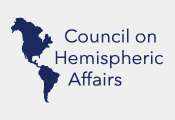Council on Hemispheric Affairs
 | |
| Formation | 1975 |
|---|---|
| Type | Non-governmental organization |
| Headquarters | Washington, D.C., United States |
| Location |
|
Director | Larry Birns |
Revenue (2015) | $55,127[1] |
| Expenses (2015) | $83,630[1] |
| Website |
www |
The Council on Hemispheric Affairs (COHA) is a leftist[2][3][4] Washington, D.C.-based non-governmental organization (NGO) founded in 1975.[5]
History
The Council on Hemispheric Affairs was founded in 1975 to promote the interest of the American hemisphere, to take regional issues into focus and to reinforce the importance of inter-American relations. One focus is the development of a constructive US policy with regards to the Latin American countries. COHA decided in 1982 that in the future it will observe Canada's relations with Latin America. Since its inception, the leadership of the COHA is made up of representatives of major trade unions, organizations and religious groups, and also includes important civic and academic figures. COHA supports representative democracy and pluralistic institutions. COHA is non-partisan and is not part of political alliances. It supports open and democratic political processes and condemns all authoritarian regimes. In the past, the COHA has expressed criticism of US policy towards Haiti, Cuba, Venezuela and neo-liberal social reforms in Latin America.[6]
Director
Larry Birns has been the director of COHA since its founding in 1975. A former defense researcher and strategist and member of the Institute for Strategic Studies in London, and a member of Oxford's All Souls College, he was a senior grade public affairs officer for the United Nations Economic Commission for Latin America in Santiago, Chile during the Allende government. Birns taught and lectured for 15 years in the fields of Latin American studies, comparative government, and international law at a number of U.S. and British colleges and universities.
Reception
The Boston Globe describes Birns as a lobbyist and a Leftist liberal critic of U.S. policy,[7] and The New York Times says the Council on Hemispheric Affairs is a liberal research group specializing in United States-Latin America relations.[8] The Los Angeles Times describes the COHA as a liberal think tank.[9]
The Heritage Foundation stated that the Council on Hemispheric Affairs had a leftist positioning and would exaggerate negative publicity about right-wing governments in Latin America and was funded by Orlando Letelier.[2] The council was also described as a leftist lobby by Ofira Seliktar in Failing the Crystal Ball Test.[3]
Funding
The Council on Hemispheric Affairs was allegedly founded with assistance from Orlando Letelier and Richard Barnet of the left-wing think tank, Institute for Policy Studies.[2] It has been funded by the Judith Loeb Chiara Foundation.[10]
See also
References
- 1 2 "Council on Hemispheric Affairs Inc" (PDF). Foundation Center. Retrieved 24 August 2017.
- 1 2 3 Frawley, Joan. "The Left's Latin American Lobby". The Heritage Foundation. Retrieved 20 February 2015.
- 1 2 Seliktar, Ofira (2000). Failing the crystal ball test : the Carter administration and the fundamentalist revolution in Iran ([Online-Ausg.] ed.). Westport, Conn [u.a.]: Praeger. p. 44. ISBN 0275968723.
- ↑ Vadum, Matthew (19 March 2008). "Terrorist-Supporting Venezuelan Strongman Has Famous Allies". Human Events. Retrieved 25 February 2016.
- ↑ "About COHA".
- ↑ "About COHA". Council on Hemispheric Affairs. Retrieved 16 March 2015.
- ↑ Stephen Kinzer, Globe Correspondent. Coping with Latin America; At issue: how should we deal with leftists. Boston Globe Boston, Mass.: Jul 15, 1980. pg. 1
- ↑ TREASTER, JOSEPH B. MAN IN THE NEWS; LATIN ENVOY: MR. SIMPATICO. New York Times. New York, N.Y.: Jun 2, 1983. pg. A.7
- ↑ T. Christian Miller and Stephen Ixer. A Top Chavez Foe Jailed for Role in Strike; Renewed protests are possible as the regime targets two business and union leaders. Los Angeles Times. Los Angeles, Calif.: Feb 21, 2003. pg. A.3
- ↑ "Paid Notice: Deaths CHIARA, JUDITH HELEN LOEB". 18 November 2010 – via NYTimes.com.